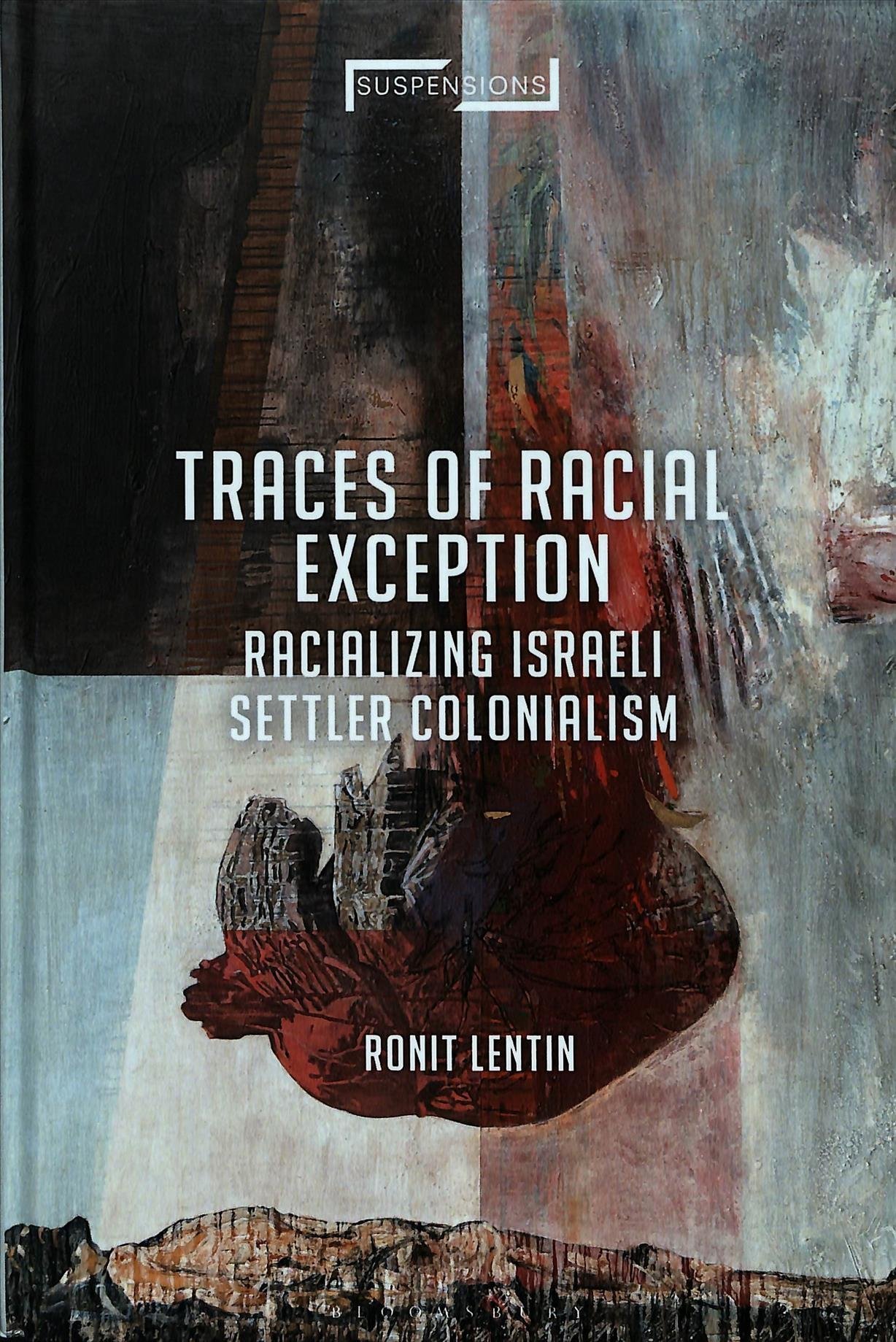Traces of Racial Exception: Racializing Israeli Settler Colonialism
by Ronit Lentin. London: Bloomsbury Academic, 2018. 224 pages. $84.00 cloth, $27.96 paper, $21.57 e-book.
Published online: 25 Jan 2021
Journal of Palestine Studies, January 2021
Location and methodology are crucial to understanding Ronit Lentin’s latest book, Traces of Racial Exception: Racializing Israeli Settler Colonialism, a work that brings together her long experience as a Jewish anti-Zionist activist and critical race theorist. Positioning herself as an Ashkenazi Jew, Lentin witnesses: “I write this book about the perpetrators, fully aware of my privilege as a member of the colonizing collectivity” (p. 7). Her topic: Israel’s settler-colonial racialization of Palestinians and non-Ashkenazi Jews alike.
Traces of Racial Exception is made up of five chapters and a conclusion. The first chapter traces race in the settler colony and identifies it as structural to colonialism. The second chapter argues against the claim that Israel is a racial state of exception. The third argues that settler colonialism is a process, not an event. The fourth chapter locates race at the heart of the colonial project. Chapter 5 re-presents Palestine from a gender perspective. Finally, chapter 6 recasts the Israeli settler-colonial state in an international context and relates the Palestinian (Indigenous) anti-colonial struggle to global movements.
Beginning with a literature review establishing racialized settler colonialism as the foundation of the Israeli state, the author considers Ilan Pappé’s work on ethnic cleansing and rejects the term “ethnic” for the Palestinian people, the Indigenous inhabitants of Palestine. Continuing, she points out that settler colonialism is a continuous process in Canada, Australia, the United States, and elsewhere, so Pappé’s characterization of Israel as the last “active settler-colonialist project” in existence cannot stand. Further, Lentin describes how she abandoned her early embrace of Giorgio Agamben and Michel Foucault to discard their methodology as Eurocentric. I part with the author’s critique of these influential theorists (p. 22), who have been used extensively by Palestinian scholars.
Having preferred John Docker’s “genocide” to Pappé’s “ethnic cleansing,” Lentin describes the Zionist state’s ongoing treatment of Palestinian Bedouins, who inhabit “legal and conceptual liminality” and are central to theorizing Israel as a racial state (p. 52). The author demonstrates the racial regime does not apply to the occupied territories of 1967 alone, as some Israeli scholars argue. Israeli settler colonialism, according to Lentin, is no “new paradigm” but past and present: for the occupied Palestinian territories, for the state’s Palestinian citizens, and for the Palestinian Bedouins. This continuity of the Zionist settler-colonial project proves systemic racialization.
What gives Lentin’s analysis power is that she stands as one of very few Israeli Ashkenazi scholars who demonstrates keen interest and concern toward Arab Palestinians and Arab Jews. In chapter 4 she sets forth Israel’s racialization of Jews through the case of the “disappeared” Yemeni children (p. 79). She also spotlights the 2014 Tikkun documentary Ringworm Scandal: When Israeli Doctors Killed Tens of Thousands of Arab Children and a central character in the film, professor Chaim Sheba, a senior Israeli doctor who experimented on Palestinian and Arab Jewish immigrant children. The surprise here is the revelation that Sheba was the author’s mother’s beloved first cousin. This ugly fact has moved Lentin to take responsibility for what others in her Ashkenazi family have done. According to Lentin, Sheba played a central role in “constructing intra-Jewish racial categorization through experimental treatments.” This episode, in addition to being devastating personally, also “debunks the Israeli ‘melting pot’ myth of uniting the ‘Jewish nation’ in one territory”—and reveals the white supremacy of ruling Ashkenazi elites (p. 81).
Following Alana Lentin, the author sees race as central to nation-state formation and focuses on what race does, not what it is. Zionism historically conceptualized Jews as a superior race, leading the State of Israel to enact racial technologies of segregation, categorization, and discrimination. Lentin’s theorization builds on Patrick Wolfe’s famous saying: “Race is colonialism speaking” (as quoted on p. 85). The author likens “white fragility” to Zionist discourse on Jewish victimhood, in which “fragility” is a cover for Israel’s military state and constant wars against the Palestinians and neighboring states. White fragility and Jewish victimhood, as the author states, “remain central instruments of socialization that enable Israel to justify the colonization project morally” (p. 115).
Borrowing from Wolfe’s Traces of History: Elementary Structures of Race (Verso, 2016), Lentin develops an excellent analysis of race and the Zionist colonial project. She deploys Wolfe’s theorization of race as a “classificatory concept,” applying it to the Israeli settler-colonial regime (p. 103) in which Jewish Israelis are “full” humans; Palestinians and Arab Jewish citizens are “not quite humans;” and occupied, besieged, and diasporic Palestinians are “non-humans.” The process of deracination of Mizrahi and Arab Jews, especially Yemenis and Ethiopians, did not turn them into equal citizens—it was a mere consequence of Israel’s need for soldiers. Finally, she explains, treating race as doing renders the concept of racism redundant. For race is an ism, a process, and a constant systemic doing.
Chapters 4 and 5 are rich in information and detailed analysis of the Zionist colonial racialization’s internal dynamics, especially of the Palestinians of the occupied territories of 1967. Lentin explains how “identity cards” become primary instruments in racialization and surveillance, “essential tools in Israel matrix of control” (p. 111). They also regulate mobility and residency, albeit not bestowing citizenry rights, in keeping with Israel’s racialized regime.
The author pays special attention to Israeli manipulation of public opinion and is keen on showing the falsity of hasbara that equates criticism of Israel with anti-Semitism. Her argument, partly based on refusing the concept that Jews are either a race or a nation, concludes that Israeli discourses of race are occluded by privileging ethnicity over race, falsely homogenizing the heterogeneous population.
Finally, Lentin’s anti-colonial, feminist approach to gender foregrounds the agency of women, their past and present struggle, and their resistance against Israeli settler colonialism. She discusses sexual torture, the threat of rape, actual rape in Israeli jails, and the treatment of women at checkpoints where numbers of pregnant women died when their ambulances were refused passage.
The author’s logic, analysis, and methodology in identifying settler colonialism as a process, not an event, carries her argument throughout the book. The result is a cutting-edge look at settler colonialism and racialization that is deeply concerned with the human suffering of its victims. I strongly recommend this book for academics and students of settler colonialism, race and racialization, and Palestine and Israel studies.
Nahla Abdo is professor in the Sociology and Anthropology department at Carleton University.

